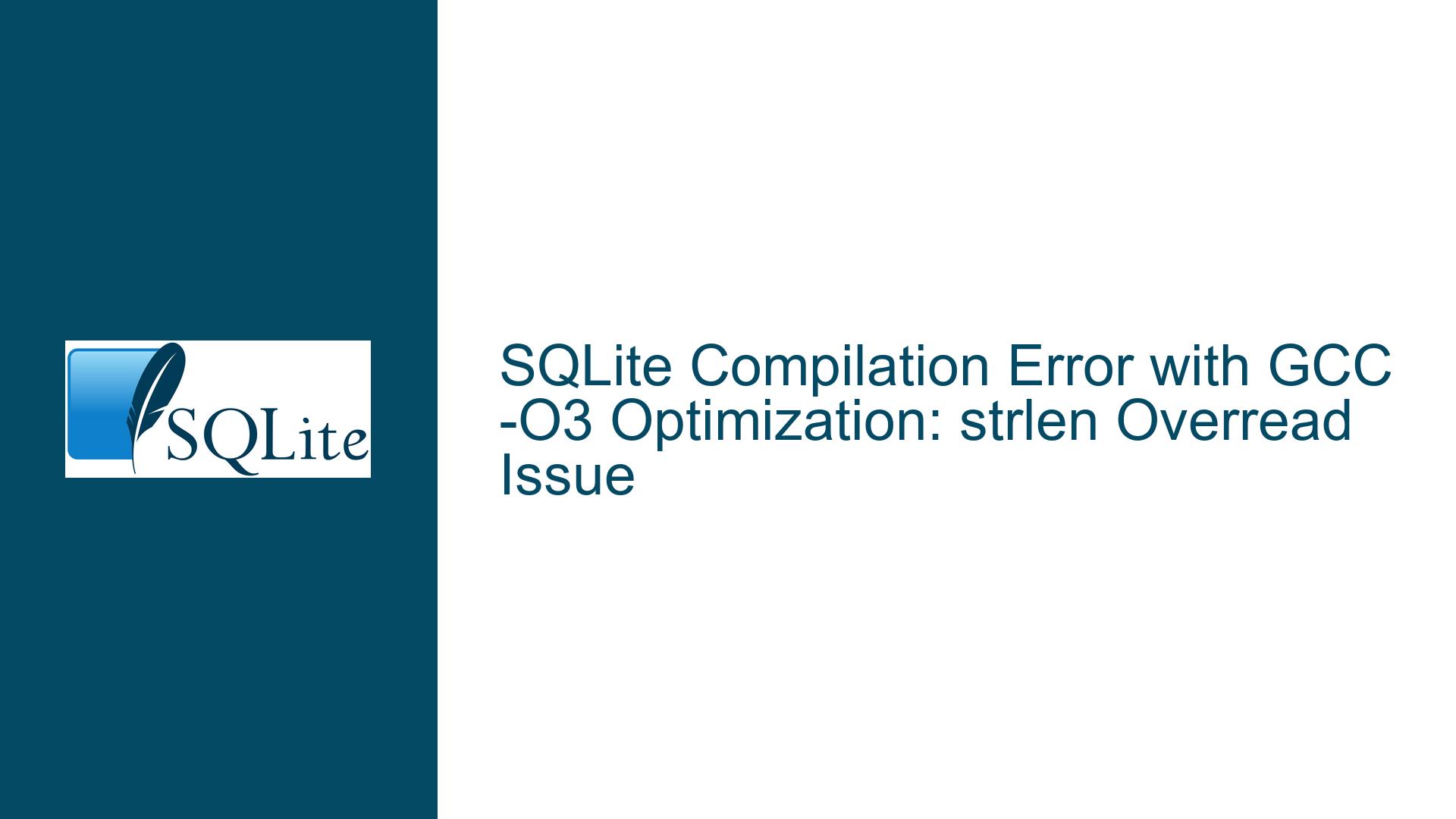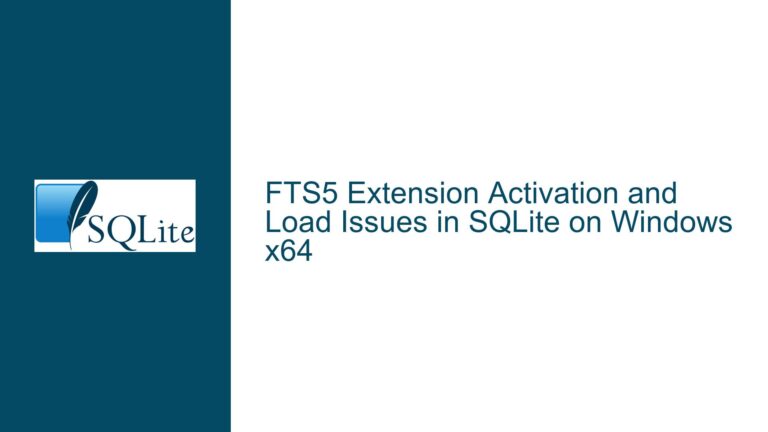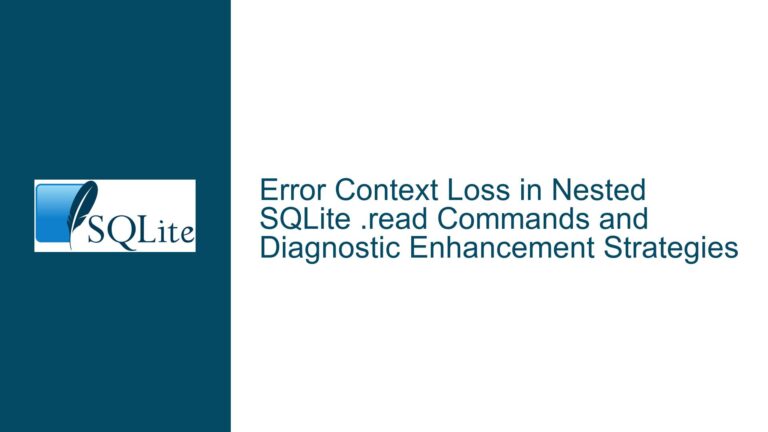SQLite Compilation Error with GCC -O3 Optimization: strlen Overread Issue
SQLite Compilation Error with GCC -O3 Optimization
When compiling SQLite version 3.49.1 amalgamation using GCC 14.2 with the -O3 optimization flag, a specific error arises in the sqlite3Strlen30 function. The error message indicates a potential overread issue with the strlen function, where GCC believes that strlen is reading from a region of memory that has a size of zero. This error does not occur when using the -O2 optimization flag, suggesting that the issue is tied to the more aggressive optimizations enabled by -O3.
The error message specifically points to the following line in the SQLite source code:
return 0x3fffffff & (int)strlen(z);
Here, z is a pointer to a string, and the strlen function is used to calculate its length. The 0x3fffffff mask ensures that the result is within a safe range, but GCC’s static analysis under -O3 flags this as a potential overread. This issue is particularly interesting because it does not manifest under -O2, indicating that the problem is related to how GCC’s optimizer interprets the code at higher optimization levels.
GCC Optimization Aggressiveness and strlen Overread Detection
The root cause of this issue lies in the interaction between GCC’s optimization logic and the SQLite source code. When -O3 is enabled, GCC performs more aggressive optimizations, including inlining functions and applying stricter static analysis to detect potential memory access issues. In this case, GCC’s optimizer is interpreting the strlen call in sqlite3Strlen30 as potentially reading from an invalid memory region, even though the code is designed to handle such cases safely.
The sqlite3Strlen30 function is a utility function in SQLite that ensures the length of a string does not exceed a certain limit. It is used in various parts of the SQLite codebase, including the sqlite3ColumnSetColl function, where the error is being triggered. The function is defined as follows:
static int sqlite3Strlen30(const char *z){
return 0x3fffffff & (int)strlen(z);
}
The 0x3fffffff mask ensures that the result of strlen is always a non-negative integer within a safe range. However, GCC’s optimizer under -O3 is interpreting this as a potential overread because it assumes that z could be a null pointer or point to an invalid memory region. This is a false positive, as the SQLite codebase ensures that z is always a valid string pointer when sqlite3Strlen30 is called.
This issue has been observed in previous versions of GCC and SQLite, as evidenced by forum posts and bug reports. It is not unique to GCC 14.2 or SQLite 3.49.1, but it is more likely to manifest with newer versions of GCC due to improvements in the optimizer’s static analysis capabilities.
Mitigating GCC -O3 Optimization Errors in SQLite Compilation
To address this issue, several approaches can be taken, depending on the specific requirements and constraints of the project. Below are the most effective solutions and troubleshooting steps:
1. Disable Specific GCC Optimizations
One straightforward solution is to disable the specific optimization that is causing the error. This can be done by adding the -fno-builtin-strlen flag to the GCC command line. This flag tells GCC not to use its built-in version of the strlen function, which can help avoid the overread detection issue. The modified compilation command would look like this:
gcc -c -DSQLITE_ENABLE_JSON1 -mavx -march=ivybridge -Wall -Werror -Wextra -Wno-unused-but-set-variable -Wno-unused-parameter -std=c11 -O3 -fno-builtin-strlen sqlite3-49-1-amalg.c
This approach is effective but may have a minor impact on performance, as the built-in strlen function is typically highly optimized.
2. Modify the SQLite Source Code
Another approach is to modify the SQLite source code to make it more compatible with GCC’s optimizer. One possible modification is to add a null check before calling strlen in the sqlite3Strlen30 function. This would look like this:
static int sqlite3Strlen30(const char *z){
if(z == NULL) return 0;
return 0x3fffffff & (int)strlen(z);
}
This change ensures that z is never a null pointer when strlen is called, which should satisfy GCC’s static analysis. However, this approach requires modifying the SQLite source code, which may not be desirable in all cases, especially if you want to maintain compatibility with upstream releases.
3. Use a Different Optimization Level
If the above solutions are not feasible, the simplest approach is to compile SQLite with a lower optimization level, such as -O2. This avoids the issue entirely, as the error does not occur with -O2. The compilation command would be:
gcc -c -DSQLITE_ENABLE_JSON1 -mavx -march=ivybridge -Wall -Werror -Wextra -Wno-unused-but-set-variable -Wno-unused-parameter -std=c11 -O2 sqlite3-49-1-amalg.c
While this approach avoids the issue, it may result in slightly lower performance compared to -O3.
4. Report the Issue to GCC and SQLite Developers
If you believe that this is a genuine bug in either GCC or SQLite, you can report the issue to the respective development teams. For GCC, you can file a bug report with the GCC Bugzilla system. For SQLite, you can submit a bug report through the SQLite website. When reporting the issue, be sure to include the exact error message, the GCC version, the SQLite version, and the compilation flags used.
5. Use a Different Compiler
If the issue persists and none of the above solutions are acceptable, you can consider using a different compiler, such as Clang. Clang has a different optimization strategy and may not exhibit the same issue. The compilation command for Clang would be similar to the GCC command:
clang -c -DSQLITE_ENABLE_JSON1 -mavx -march=ivybridge -Wall -Werror -Wextra -Wno-unused-but-set-variable -Wno-unused-parameter -std=c11 -O3 sqlite3-49-1-amalg.c
This approach may require additional testing to ensure compatibility with your project.
6. Review and Update SQLite Version
Finally, it is worth checking if the issue has been resolved in a newer version of SQLite. SQLite is actively maintained, and bugs are regularly fixed in new releases. If a newer version of SQLite is available, consider updating to that version and re-testing the compilation with -O3.
Conclusion
The SQLite compilation error with GCC’s -O3 optimization flag is a known issue that arises due to the aggressive optimizations performed by GCC. By understanding the root cause of the issue and applying one of the solutions outlined above, you can successfully compile SQLite with -O3 or mitigate the issue through alternative means. Whether you choose to disable specific optimizations, modify the source code, or use a different compiler, the key is to carefully evaluate the trade-offs and select the approach that best fits your project’s requirements.






